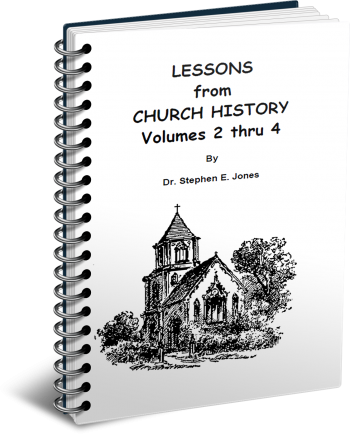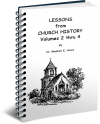Latest Posts
View the latest posts in an easy-to-read list format, with filtering options.

Volumes 2-4. This is the history of the Church from the Roman War (66-73 A.D.) to Constantine and the Council of Nicea in 325 A.D. with lessons to be learned from it.
Category - History and Prophecy

When Christianity was small, it needed very little organization. As it grew, however, more organization was needed simply to accommodate the larger numbers of people as they outgrew the homes where they were meeting.
Organization itself is not evil, as some have implied. I have heard it said or implied that the Church should be an organism, not an organization. While that may have a nice ring to it, the difference is merely a case of semantics. Every organism is the epitome of organization. It should rather be stated that the Church should be organized, not chaotic—or that the Church should be a living organism, not a dead form of an organism that once lived.
Chaos or death is the problem—not organization itself. Nor is structure the problem. On earth the things of the Spirit seek structure, for that is how spirit manifests in the earth. Organizational structure itself is not the problem, nor are buildings, steeples, or church pews real problems. The problem comes when structures, buildings, and legal paperwork are identified as the Church and thus replace the congregation (people) as the Bride of Christ.
When that problem occurs, you know that structure has usurped authority over spirit. This has occurred because those in authority themselves have usurped authority over Jesus Christ. And so, when it is claimed that the organization is the Church and that no one can be a member of the Church without being a member of a particular denomination--this is evidence that the True Church has been usurped by an imitation church.
The most important factor in this is the doctrine that demands submission to men in order to be in proper submission to Jesus Christ. It teaches that certain men are vicars who represent Christ, and that to submit to these vicars is the same as submitting to Christ. That is the problem. In fact, that is the biblical definition of ANTICHRIST.
If anyone is looking for a future Antichrist, just take a look around you. Antichrist already rules most of those who call themselves Christians. You do not need a one-world religion to have an Antichrist. Such a person, if he should ever manifest on the earth, would simply be a BIGGER Antichrist than the rest of them.
In the beginning, the soul usurped authority over the spirit, thinking it had a better idea. The soul usurped the authority of the spirit within man and has been ruling ever since—except in those who have been trained to follow the leading of the Spirit (that is, the human spirit in which the Holy Spirit operates).
The story of King Saul is one of the great historical allegories portraying this simple truth. When God brought Israel into Canaan, they were ruled by God directly. There was certainly organization in Israel, for each tribe had its prince and its judges. But God was considered to be the King, and each prince of the tribe was subject to the divine law. He was not a legislator. The prince was not the law. The law was king. The judges had no right to legislate, but to enforce the law that had been given by God through Moses.
Israel was a theocracy, and God Himself judged Israel whenever they violated the First Commandment and worshipped other gods. In fact, in their first three centuries, God put them into 111 years of captivity to other nations for worshipping the gods of those other nations. After the final captivity to the Philistines, which had lasted a full 40 years, the people got tired of God as their King. They wanted a king who was more like them and who understood them better. They wanted a king with lower standards, one who would not put them into captivity on account of their idolatry.
And so God gave them Saul to be their king. This arrangement would have worked reasonably well if the king had continued to recognize God as the sovereign over him. Samuel made this very clear in 1 Sam. 12:19-25 as he exhorted the people to “serve the Lord with all your heart.”
But Saul soon usurped the throne of God. He thought of himself as a vicar of God, who ruled upon God's throne. And he was right in this. But the moment he disobeyed the commands of God, he usurped God's throne and authority, claiming that he had the divine right to rule as he saw fit. Saul did not know the difference between authority and sovereignty. He had been given authority, but he claimed sovereignty.
Authority is authorized by a higher power and is commissioned to act on behalf of that higher power. Authority has no power of its own, but seeks to do the will of the sovereign who is above him. Saul violated this sacred trust first when he usurped the priestly-prophetic authority by offering up the sacrifice himself, instead of waiting for Samuel (1 Sam. 13:9).
Secondly, he violated this sacred trust when he made a rash vow forbidding any man to eat until the evening when the battle was concluded (1 Sam. 14:24). The result was that the people were so hungry that they ate blood (14:32). Saul caused the people to become “blood-thirsty.”
Thirdly, he violated this sacred trust when he refused to pass judgment upon the Amalekite King Agag (1 Sam. 15:8). Amalek had reached the end of its grace period after attacking Israel as they came out of Egypt (Ex. 17:16). Moses put a curse on Amalek at that time, and the 18th year of King Saul was 414 years later—the factor of Cursed Time. When Saul spared Agag, he took upon himself the curse that Moses had laid upon Amalek.
These are examples of how Saul usurped the throne and became an anti-christ, one who rules “in place of Christ,” as the term indicates. So God forsook him and called David to rule. David was different from Saul in that David attempted to rule as God would rule. David considered the throne to be a sacred trust. He rules in place of Christ, not as a usurper, but as a steward.
King Saul was crowned on the day of wheat harvest (Pentecost), as we read in 1 Sam. 12:17. He was a type of the Church under Pentecost. Saul's life prophesied of the Church under its own pentecostal anointing. And this is where a study of Church history has its value. It is a matter of seeing how the Church came to fulfill the prophetic pattern laid down by King Saul in the Old Testament.
Church organization was not the problem. Paul established organization when he ordained elders in each town where he preached. Buildings were not the problem, because each group met in a home, which was a building designed to provide shelter. The problem came when the people and bishops came to think of their earthly organizations in the way King Saul had viewed Israel.
King Saul thought that leadership meant having servants. Jesus made this correction in Matt. 20:25-28, telling the disciples that leadership meant serving others, not lording it over others. It meant being a servant, not having servants serve him. Saul did not understand this, nor do many Christian leaders today. I have seen with my own eyes many examples of ministers who tell their congregations of their obligations to serve him as if he were Christ Himself. This is antichrist.
The prime motives behind this antichrist spirit are ambition, pride, and rebellion against God. We see this in Saul. We see it developed in the second-century Christian Church and continued to this very day. As this developed in the early Church, “heresies” came to the forefront, and they were often crushed by an antichrist spirit. As Rev. 2:4 says, they had lost their first love. Unity usurped the foremost seat that had been reserved for love. Unity became the Church's prime directive, and they were willing to sacrifice love on its altar.
It is one thing to argue forcefully for the truth, but quite another to speak the truth without love.